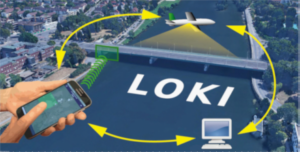On Feb 12, 2020, the kick-off meeting for the newly funded BMBF project LOKI – Airborne Observation of Critical Infrastructures (Luftgestützte Observation Kritischer Infrastrukturen) was hosted by the GIScience and 3DGeo research groups of Heidelberg University.
The aim of the LOKI project is to develop an interdisciplinary system that enables fast and reliable airborne situation assessments following an earthquake. A central focus is the timely overview and detailed recording of the damage to critical infrastructures, such as lifelines (bridges and roads), health care facilities and public institutions (e.g. schools). The objectives will be met by combining existing expertise in earthquake research with a variety of technologies and concepts, including machine learning, crowdsourcing, Unmanned Aerial Vehicles and 3D monitoring.

The kick-off meeting allowed the exchange of methods and expected results of the subprojects and project partners and the definition of their contribution to the overall project. Moreover, interfaces between workpackages (data, software, methodology etc.) and project partners were jointly elaborated.
Heidelberg University serves as the coordinator of the research project, which is a collaboration between several project partners. Within this collaboration, components and services developed by the individual partners will be integrated into a single system. The project partners of LOKI bring in their expertise in the following fields:
- Aeromey GmbH: UAV infrastructure
- FZI Research Center for Information Technology: Coordination mechanisms for UAV fleets
- German Research Center for Geoscience (GFZ): Exposure modeling
- Karlsruhe Institute for Technology (KIT): Earthquake engineering for damage classification
- Heidelberg University, 3DGeo research group: Automatic damage detection and analysis
- Heidelberg University, GIScience research group: Crowdsourcing and user-generated geoinformation

Find more details on the project website and latest project updates on Twitter or follow LOKI on ResearchGate.
The LOKI project is running from 2020-2022 and is funded by BMBF (funding code: 03G0890)



